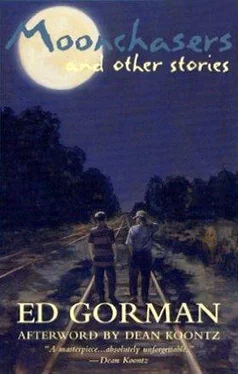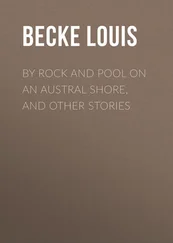“Yeah.”
“About what?”
“What the hell’s your interest, Aimee?”
“Kelly, I don’t have time to explain. Just please help me, all right?”
Kelly sighed. “Okay, kid, what do you want?”
“What’d she say to you?”
“She said she wanted to buy a gun.”
“A gun? What kind of gun?”
“The gun her brother stole from me.”
“My God.”
“What’s wrong?”
“Don’t you see?”
“See what, kid? Calm down.”
“If she wanted to buy the gun her brother stole from you then maybe she plans to use it on herself just the way her brother did.”
Kelly said, “Shit. You know, I never thought of that.”
“So you gave her the gun?”
Kelly seemed a little embarrassed now. “Yeah. Gave it to her for a hundred bucks.”
“A hundred? But Kelly that isn’t worth more than—”
“That’s what she offered me for it. So that’s what I took, kid. I never said I was no saint.”
“Where did she go?”
“Hell, how would I know?”
“God, Kelly, didn’t you notice the direction she was going?”
He shrugged. “Down near the entrance, I guess.” He looked chastened that he hadn’t paid attention.
“Thanks, Kelly. I appreciate it.”
And before he could say another word, she was gone, running fast toward the front of the midway.
There was a card table sitting next to the room’s only window. It had the uncertain legs of a young colt. He’d put his portable typewriter on it — the one she’d bought him for his birthday ten years ago — and worked long into the night.
The room had a bureau with somebody’s initials knifed into the top, a mirror mottled with age, wallpaper stained with moisture, a double bed with a paint-chipped metal headboard, and linoleum so old it was worn to wood in patches.
She tried not to think of all the sad lives that had been lived out here. Men without women; men without hope.
She made sure the door was locked behind her and then came into the room.
She could feel him here, now. She had always believed in ghosts — were ghosts any more unlikely than men and women who only grew to be three-and-a-half feet tall? — and so she spoke out loud to him for the first time since being told of his suicide.
“I hope you know how much I love you, brother,” she said, moving across the small, box-like room to the card table, running her fingers across the small indentations the Smith-Corona had made on the surface.
She decided against turning the overhead light on.
The on-and-off red of the neon was good enough.
“I miss you, brother. I hope you know that, too.”
She heard the clack of a ghostly typewriter; saw her brother’s sweet round face smiling up at her after he’d finished a particularly good sentence; listened to the soft sad laughter that only she’d been able to elicit from him.
“I wish you would have called me, brother. I wish you would have told me what you had in mind. You know why?”
She said nothing for a time.
Distant ragged traffic sounds from the highway; the even fainter music of the midway further away in the darkness.
“Because I would have joined you, brother. I would have joined you.”
She set her purse on the card table. She unclasped the leather halves and then reached in.
The gun waited there.
She brought out the gun with the reverence of a priest bringing forth something that has been consecrated to God.
She brought out the gun and held it for a time, in silhouette, against the window with the flashing red neon.
And then, slowly, inevitably, she brought the gun to her temple.
And eased the hammer back.
At the entrance, Aimee asked fourteen people if they’d seen the woman. None had. But the fifteenth did, and pointed to a rusted beast of a taxi cab just now pulling in.
Aimee ran to the cab and pushed her head in the front window before the driver even stopped completely.
“The dwarf woman. Where did you take her?”
“Who the hell are you?”
“The woman, where did you take her?” Aimee knew she was screaming. She didn’t care.
“Goddamn, lady. You’re fucking nuts.” But despite his tough words, the cab driver saw that she was going to stay here until she had her answer. He said, “I took her to the Ganges Arms. Why the hell’re you so interested, anyway?”
“Then take me there, too,” Aimee said, flinging open the back door and diving in. “Take me there, too!”
She went over and sat on the bed.
That would make it easier for everybody. The mess would be confined to the mattress. A mattress you could just throw out.
She lay back on the bed.
Her shoes fell off, one at a time, making sharp noises as they struck the floor.
Two-inch heels, she thought. How pathetic of me. Wanting so desperately to be like other people.
She closed her eyes and let the sorrow come over her. Sorrow for her brother and herself; sorrow for their lives.
She saw him again at his typewriter; heard keys striking the eternal silence.
“I wish you would have told me, brother. I wish you would have. It would have been easier for you. We could have comforted each other.”
She raised the hand carrying the gun, brought the gun to her temple once again.
The hammer was still back.
“Can’t you go any faster?”
“Maybe you think this is an Indy race car or somethin’, huh, lady?”
“God, please; please just go as fast as you can.”
“Jes-uz,” the cab driver said. “Jes-uz.”
She said a prayer, nothing formal, just words that said she hoped there was a God and that he or she or it or whatever form it took would understand why she was doing this and how much she longed to be with her brother again and that both God and her brother would receive her with open arms.
She tightened her finger on the trigger and then—
— the knock came.
“Hon?”
Oh, my Lord.
“Hon, you awake in there?”
Finding her voice. Clearing her throat. “Yes?”
“Brought you some Kool-Aid. That’s what I drink all summer. Raspberry Kool-Aid. Quenches my thirst a lot better than regular pop, you know? Anyway, I brought you a glass. You wanna come get it?”
Did she have any choice?
Linnette lay the gun down on the bed and pulled the purse over the gun.
She got up and straightened her skirt and went to the door.
A long angle of dirty yellow light fell across her from the hallway.
The woman was a lot heavier than she’d looked downstairs. Linnette liked her.
The woman bore a large glass of Kool-Aid in her right hand and a cigarette in her left. She kept flicking her ashes on the hallway floor.
“You like raspberry?”
“Thank you very much.”
“Sometimes I like cherry but tonight I’m just in a kind of raspberry mood. You know?”
“I really appreciate this.”
The woman nodded to the stairs. “You get lonely, you can always come down and keep me company.”
“I think I’ll try and get some sleep first but if I don’t doze off, I’ll probably be down.”
The woman looked past Linnette into the room. “You got everything you need?”
“I’m fine.”
“If your brother’s room starts to bother you, just let me know. You can always change rooms for no extra cost.”
“Thanks.”
The woman smiled. “Enjoy the Kool-Aid.” She checked the man’s wristwatch she wore on her thick wrist. “Hey, time for Blackie.”
“Blackie?”
“Boston Blackie. You ever watch him?”
“I guess not.”
“Great show; really, great show.”
“Well, thank you.”
“You’re welcome. And remember about keeping me company.”
“Oh, I will. I promise.”
Читать дальше












